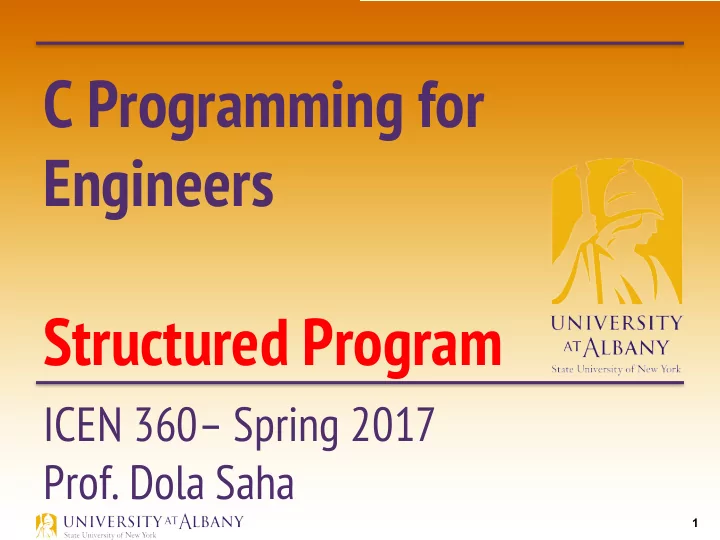

C Programming for Engineers Structured Program ICEN 360– Spring 2017 Prof. Dola Saha 1
Switch Statement Ø Used to select one of several alternatives Ø useful when the selection is based on the value of § a single variable § or a simple expression Ø values may be of type int or char § not double 2
switch Statement switch (controlling expression) { label set 1 statements 1 break; label set 2 statements 2 break; . . . label set n statements n break; 3
switch Statement Example 4
Class Assignment Ø Write a program that takes letter grade ‘A’, ‘B’, ‘C’, ‘D’ or ‘E’ and prints the range of score as below. 5
Class Assignment Ø Write a program that takes the x – y coordinates of a point in the Cartesian plane and prints a message telling either an axis on which the point lies or the quadrant in which it is found. y QI I QI x QIII QI V Ø Sample lines of output: § (-1.0, -2.5) is in quadrant III § (0.0, 4.8) is on the y- axis 6
Iteration Statement Ø Repeat a set of actions while some condition remains TRUE Ø Example: Condition § While there are more students in class raising their hand Action Answer a question and let him/her lower the hand § While there are more items on my shopping list Purchase next item and cross it off my list Ø Usually, action statements modify variables that affect the condition Ø CAUTION: Check when the condition becomes FALSE Ø Can be single statement or multiple (block) 7
While Statement in C while (condition) { … } 8
While Statement in C while (condition) { … } Ø Previously used Equation: ax 3 +7 Ø Code to compute x 3 times=1; product =1; while ( times <= 3 ) { product = x * product; times = times+1; } // end while 9
�� Formulating algorithm – counter controlled iteration Ø Consider the following problem statement: § A class of ten students took a quiz. The grades (integers in the range 0 to 100) for this quiz are available to you. Determine the class average on the quiz. ∑ ,-./0 Ø 𝑑𝑚𝑏𝑡𝑡 𝑏𝑤𝑓𝑠𝑏𝑓 = 23450- 67 893/0298 10
Counter controlled iteration Ø Uses a variable called a counter to specify the number of times a set of statements should execute. Ø Counter-controlled iteration is often called definite iteration because the number of iterations is known before the loop begins executing. 11
Counter controlled iteration - pseudocode 12
Counter controlled iteration – C code 13
Counter controlled iteration – C code continued 14
Initialization phase Ø A total is a variable used to accumulate the sum of a series of values. Ø A counter is a variable used to count—in this case, to count the number of grades entered. Ø An uninitialized variable contains a “garbage” value—the value last stored in the memory location reserved for that variable. 15
Formulating algorithm – Sentinel Controlled Iteration Ø Consider the following problem: § Develop a class-average program that will process an arbitrary number of grades each time the program is run. Ø In this example, the program must process an arbitrary number of grades. 16
Sentinel Controlled Iteration Ø Use a special value called a sentinel value (also called a signal value, a dummy value, or a flag value) to indicate “end of data entry.” Ø Sentinel-controlled iteration is often called indefinite iteration because the number of iterations isn’t known before the loop begins executing. Ø Sentinel value must be chosen so that it cannot be confused with an acceptable input value. 17
Sentinel controlled iteration - pseudocode 18
Sentinel controlled iteration – C code 19
Sentinel controlled iteration – C code This would cause an infinite loop if -1 is not input as the first grade. 20
Sentinel controlled iteration - Output 21
Nested Control Statement Ø One control statement within another Ø Consider the following problem statement: § In a class of 10 students, get the result of the student from the user (1=pass, 2=fail) and find the number of students who failed and who passed. If more than 8 students passed, print a statement for bonus to the instructor. 22
Nested Control Statement – Pseudocode 23
Nested Control Statement – C code 24
Nested Control Statement – C code 25
Nested Control Statement – Output 1 26
Nested Control Statement – Output 2 27
Recommend
More recommend